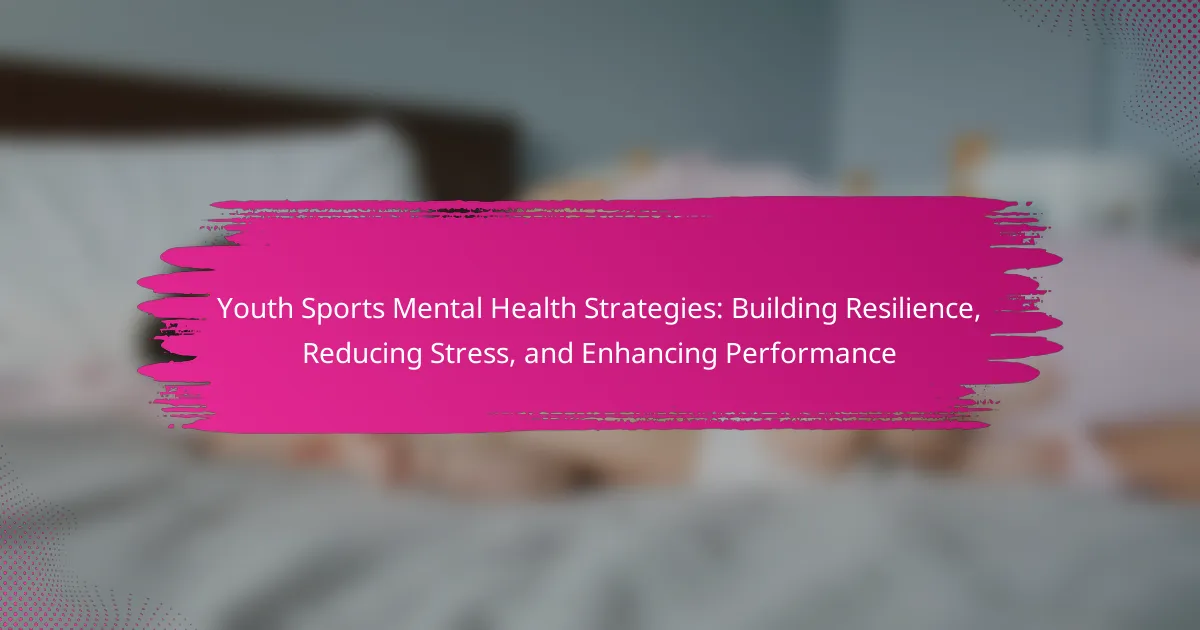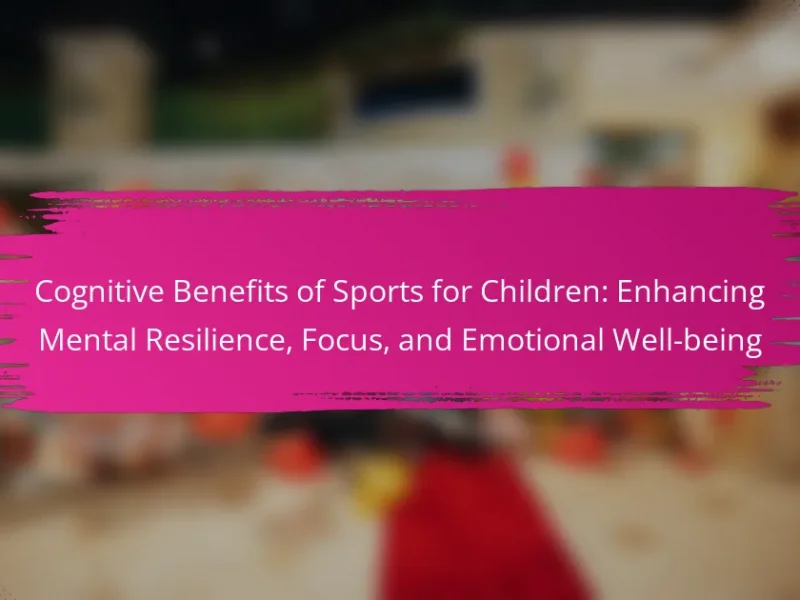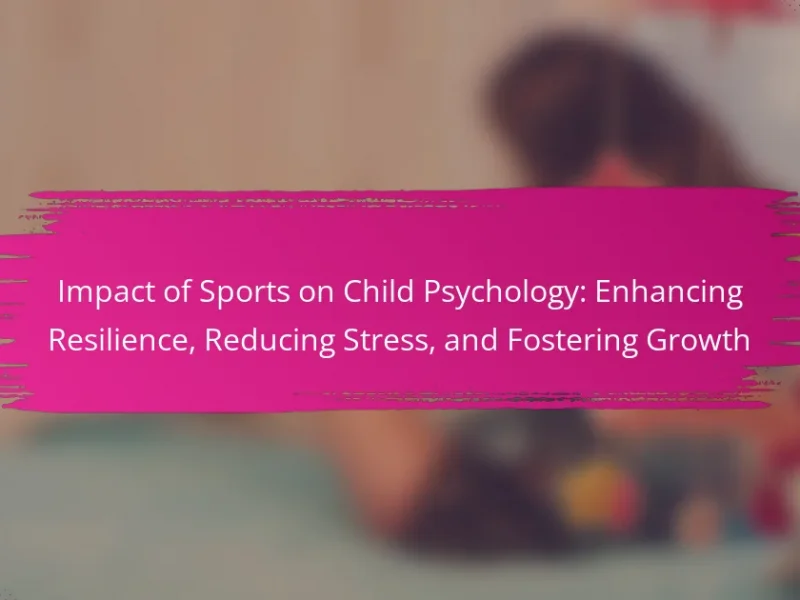Youth sports mental health strategies are essential for building resilience and enhancing performance. This article explores mindfulness training, team support systems, and positive reinforcement as effective methods for reducing stress. It also addresses common stressors like performance pressure and time management challenges faced by young athletes. By implementing these strategies, coaches and parents can foster emotional well-being and improve overall athletic development.
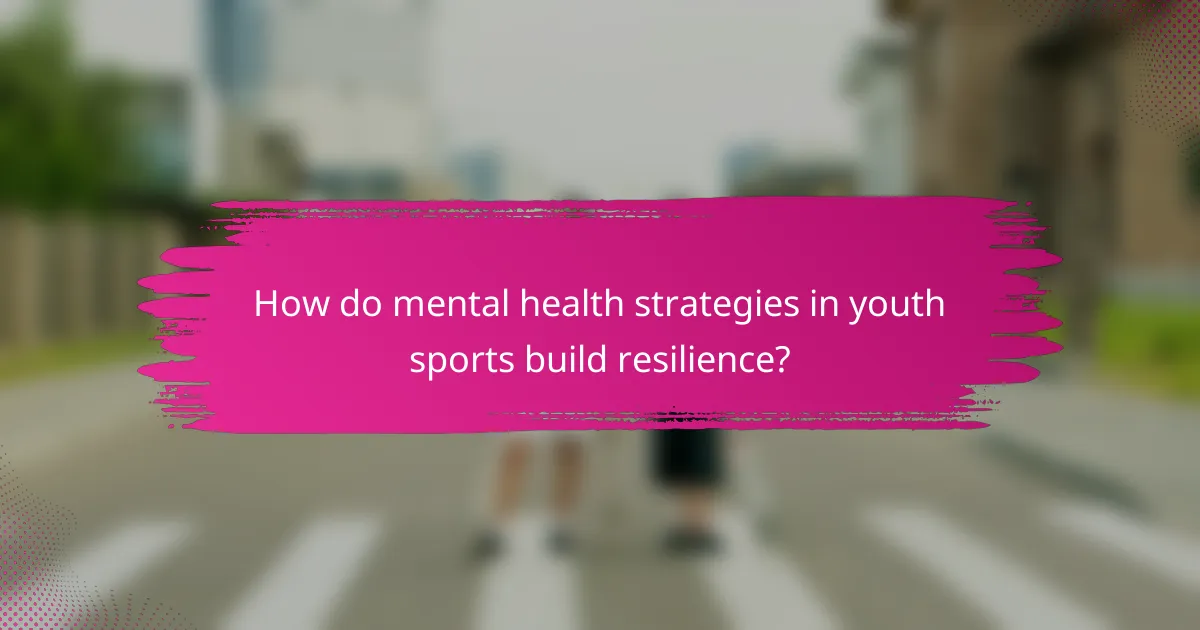
How do mental health strategies in youth sports build resilience?
Mental health strategies in youth sports build resilience by fostering coping skills and promoting emotional well-being. These strategies include mindfulness training, team support systems, and positive reinforcement.
Mindfulness training enhances focus and reduces anxiety, helping young athletes manage stress effectively. Team support systems create a sense of belonging, which is crucial for emotional stability. Positive reinforcement encourages a growth mindset, enabling youth to view challenges as opportunities for development.
Research indicates that athletes who engage in mental health strategies report higher resilience levels. For example, studies show that youth involved in structured mental health programs experience a 30% increase in coping skills.
Overall, integrating mental health strategies in youth sports not only reduces stress but also enhances performance, leading to well-rounded development.
What are the key components of resilience in young athletes?
Key components of resilience in young athletes include mental toughness, emotional regulation, social support, and adaptability. Mental toughness helps athletes maintain focus and confidence during challenges. Emotional regulation enables them to manage stress effectively. Social support from coaches and peers fosters a positive environment. Adaptability allows athletes to adjust strategies and cope with setbacks. Developing these components enhances performance and promotes overall mental health in youth sports.
How can coaches foster a resilient mindset?
Coaches can foster a resilient mindset by promoting a growth-oriented environment. They should encourage athletes to embrace challenges, learn from setbacks, and develop coping strategies. Regular feedback helps build confidence and reinforces effort over outcome. Additionally, teaching mindfulness techniques can enhance focus and reduce stress during competitions.
What role do parents play in building resilience?
Parents play a crucial role in building resilience by providing emotional support and fostering a growth mindset. They encourage youth athletes to face challenges, learn from failures, and develop coping strategies. Engaging in open communication about mental health enhances emotional intelligence and self-awareness. Research shows that supportive parenting positively impacts youth sports performance and overall well-being.
What evidence supports the effectiveness of resilience training?
Research shows resilience training effectively enhances mental health in youth sports. Studies indicate participants experience reduced anxiety, improved coping strategies, and better performance outcomes. For example, a meta-analysis found resilience training programs significantly decrease stress levels among young athletes. Additionally, programs focusing on emotional regulation and positive thinking yield measurable improvements in overall well-being. These findings underscore the importance of integrating resilience training into youth sports mental health strategies.

What are common stressors faced by child athletes?
Common stressors faced by child athletes include performance pressure, parental expectations, and time management challenges. These factors can lead to anxiety and affect mental health.
Performance pressure arises from competition and the desire to succeed, often resulting in fear of failure. Parental expectations can create additional stress, as children may feel the need to meet their parents’ goals rather than their own.
Time management challenges involve balancing sports, academics, and social life, which can overwhelm young athletes. These stressors highlight the importance of mental health strategies in youth sports to build resilience and enhance performance.
How does competition impact mental health in youth sports?
Competition in youth sports can negatively impact mental health, leading to increased stress and anxiety. High-pressure environments may diminish enjoyment and motivation, causing burnout. Strategies to mitigate these effects include fostering resilience through supportive coaching, encouraging a focus on personal growth, and promoting teamwork over individual accolades. Research indicates that balanced competition enhances performance while safeguarding mental well-being. Prioritizing mental health in youth sports cultivates a healthier athletic experience.
What are the signs of stress in young athletes?
Young athletes may exhibit signs of stress through changes in behavior, mood, and physical health. Common indicators include increased anxiety, irritability, fatigue, and withdrawal from activities. Physical symptoms can manifest as headaches, stomachaches, or changes in sleep patterns. Recognizing these signs early is crucial for implementing effective mental health strategies to support resilience and performance.
How can coaches identify stress in their players?
Coaches can identify stress in their players through observation and communication. Noticing changes in behavior, such as withdrawal or irritability, can indicate stress levels. Regular check-ins and open dialogues about feelings foster trust and encourage players to express their concerns. Monitoring physical signs like fatigue or decreased performance also helps in recognizing stress. Implementing mental health strategies, such as mindfulness practices, can further support players in managing stress effectively.

What unique strategies can enhance performance while reducing stress?
Implementing unique strategies can significantly enhance athletic performance while reducing stress in youth sports. Techniques such as mindfulness training, positive self-talk, and goal-setting foster resilience. Research shows that mindfulness can lower anxiety levels by 30%, allowing athletes to focus better. Positive self-talk encourages a growth mindset, which is essential for overcoming challenges. Setting specific, achievable goals helps athletes track progress and maintain motivation, further alleviating stress. Incorporating these strategies nurtures mental well-being and optimizes performance.
What role does mental conditioning play in performance?
Mental conditioning significantly enhances performance by improving focus, resilience, and stress management. It equips young athletes with strategies to cope with pressure, fostering a positive mindset. Mental conditioning techniques, such as visualization and mindfulness, help athletes maintain composure during competitions. Research indicates that athletes who engage in mental conditioning show marked improvements in performance metrics, including reaction time and decision-making. Overall, prioritizing mental conditioning is essential for developing well-rounded youth athletes who can thrive in competitive environments.
How can mindfulness techniques improve focus and reduce anxiety?
Mindfulness techniques can significantly enhance focus and reduce anxiety in youth athletes. Practicing mindfulness improves attention span and emotional regulation, allowing athletes to concentrate better during competitions. Techniques such as deep breathing, visualization, and body scanning help in managing stress levels, leading to improved performance. Research indicates that regular mindfulness practice can reduce anxiety symptoms by up to 30%, fostering resilience in young athletes. Incorporating these strategies into training routines promotes mental health and enhances overall athletic performance.
What specific mindfulness exercises are effective for young athletes?
Mindfulness exercises effective for young athletes include deep breathing, visualization, body scanning, and mindful movement. These practices enhance focus, reduce anxiety, and build resilience. Deep breathing helps regulate emotions, while visualization improves performance by mentally rehearsing successful outcomes. Body scanning promotes awareness of physical sensations, reducing tension. Mindful movement integrates awareness into physical activity, fostering a calm mindset. Regular practice of these techniques can significantly enhance mental health and athletic performance.

What are the universal benefits of mental health strategies in sports?
Mental health strategies in youth sports offer universal benefits such as resilience building, stress reduction, and performance enhancement. These strategies foster emotional well-being, improve focus, and promote teamwork. Research indicates that athletes who engage in mental health practices exhibit increased confidence and lower anxiety levels. As a result, implementing these strategies can significantly enhance overall athletic development and enjoyment in sports.
How do mental health strategies contribute to overall athlete well-being?
Mental health strategies significantly enhance athlete well-being by fostering resilience, reducing stress, and improving performance. These strategies include cognitive-behavioral techniques, mindfulness practices, and supportive team environments. Research indicates that athletes who engage in mental health training experience lower anxiety levels and higher focus during competitions. Additionally, implementing these strategies can lead to a unique attribute of increased emotional regulation, which contributes to overall satisfaction in sports participation. By prioritizing mental health, youth athletes can achieve a balanced approach to their physical and emotional challenges.
What positive outcomes have been observed in youth sports programs?
Youth sports programs have shown positive outcomes in mental health, including resilience building and stress reduction. Participation enhances social skills, promotes teamwork, and boosts self-esteem. Studies indicate that youth engaged in sports report lower anxiety and depression levels, contributing to improved overall well-being. Additionally, structured programs foster a sense of belonging and purpose, vital for mental health development.

What rare but impactful techniques exist for managing stress in young athletes?
Breathing techniques, mindfulness practices, and nature exposure are rare but effective methods for managing stress in young athletes. These strategies promote mental well-being and enhance performance.
Breathing techniques, such as diaphragmatic breathing, help regulate emotions and reduce anxiety. Mindfulness practices, including meditation and visualization, improve focus and resilience. Nature exposure, even brief, can lower stress levels and boost mood.
Incorporating these methods into training routines can lead to significant improvements in both mental health and athletic performance.
How can art therapy be integrated into sports training?
Art therapy can enhance sports training by promoting mental well-being and resilience in young athletes. Integrating art therapy into sports programs helps reduce stress and improve focus, which are crucial for performance. For example, creative expression through art allows athletes to process emotions, leading to better mental clarity during competitions. Research indicates that athletes who engage in art therapy report lower anxiety levels and improved coping strategies. This approach fosters a holistic development model, addressing both physical and psychological aspects of sports training.
What innovative approaches are emerging in youth sports mental health?
Innovative approaches in youth sports mental health focus on building resilience, reducing stress, and enhancing performance. Techniques like mindfulness training, cognitive behavioral strategies, and peer support systems are gaining traction. These methods improve mental well-being and foster a supportive environment. For example, mindfulness practices help athletes manage anxiety, while peer support encourages open discussions about mental health challenges. As a result, young athletes experience better emotional regulation and improved performance outcomes.
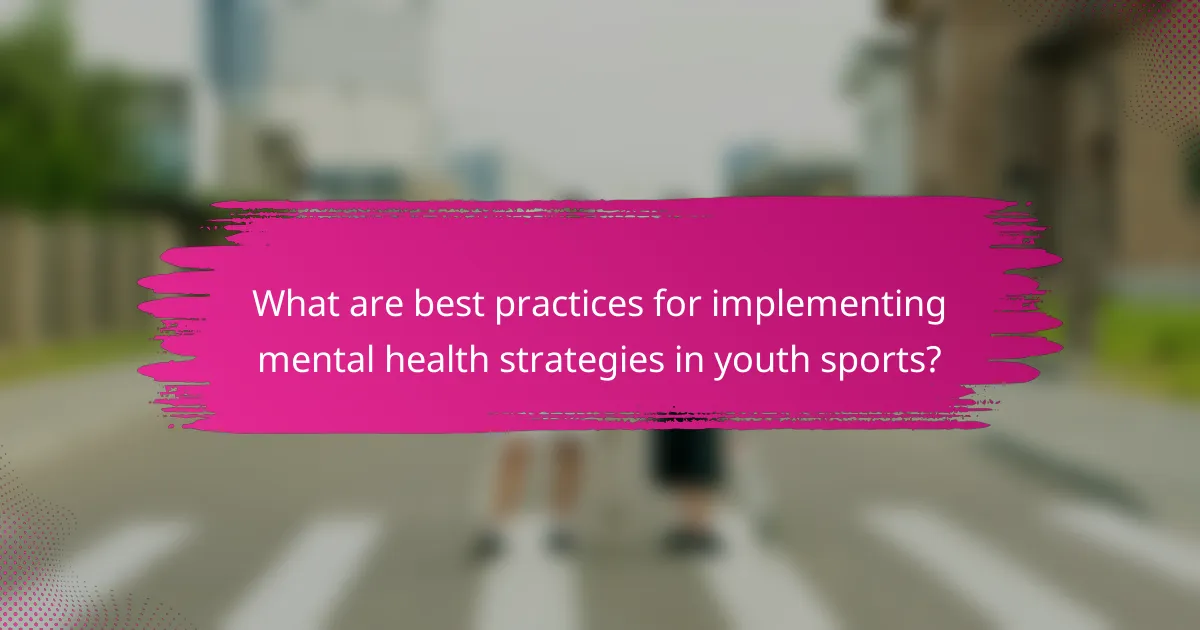
What are best practices for implementing mental health strategies in youth sports?
Implementing mental health strategies in youth sports involves promoting resilience, reducing stress, and enhancing performance. Key best practices include fostering open communication, providing mental health education, and encouraging a supportive environment.
Coaches should prioritize mental well-being by integrating mindfulness and relaxation techniques into training. Regular check-ins with athletes can identify stressors early. Engaging parents in mental health discussions creates a holistic support system.
Additionally, establishing partnerships with mental health professionals ensures access to resources. Programs that focus on team-building activities enhance social connections, further supporting mental health. Consistent evaluation of these strategies helps in adapting to the evolving needs of young athletes.
How can coaches create a supportive environment for mental health?
Coaches can create a supportive environment for mental health by fostering open communication and encouraging emotional expression. This approach builds resilience in young athletes, reduces stress, and enhances overall performance. Establishing trust allows athletes to share concerns without fear of judgment. Incorporating mental health education into training sessions promotes awareness and coping strategies. Additionally, recognizing individual strengths and providing positive reinforcement can significantly boost athletes’ confidence and mental well-being.
What common mistakes should be avoided when addressing mental health in sports?
To effectively address mental health in sports, avoid common mistakes that can hinder athlete well-being. Ignoring emotional signals can lead to increased stress and decreased performance. Failing to foster open communication prevents athletes from expressing their mental health concerns. Overemphasizing competition may create pressure, resulting in burnout. Neglecting individualized support fails to account for diverse mental health needs. Lastly, overlooking the importance of rest and recovery can impair resilience and performance.
What expert insights can guide youth sports organizations in mental health initiatives?
Youth sports organizations can enhance mental health initiatives by focusing on resilience-building strategies, stress reduction techniques, and performance enhancement practices. Implementing regular mental health workshops can foster a supportive environment. Research shows that athletes who engage in mindfulness training exhibit lower anxiety levels and improved focus. Additionally, promoting open communication about mental health can reduce stigma and encourage athletes to seek help when needed. Collaborating with mental health professionals ensures that programs are evidence-based and tailored to the specific needs of youth athletes.
